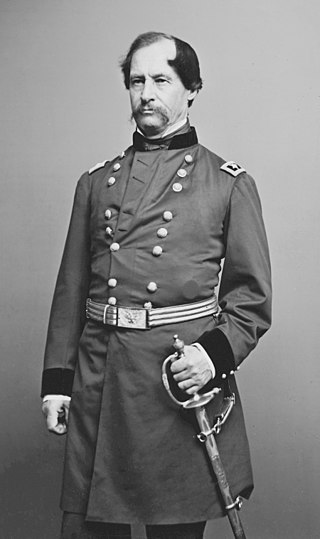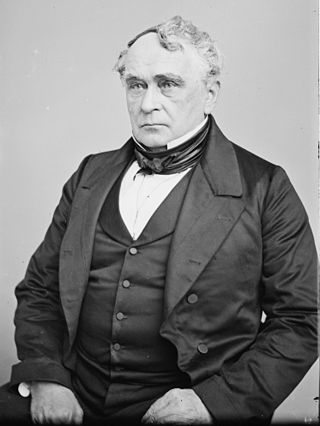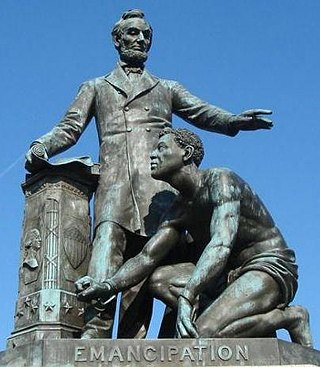History
The Confiscation Act was enacted on July 17, 1862. [3] The defining characteristic of the act was that it called for court proceedings for seizure of land and property from disloyal citizens (supporters of the Confederacy) in the South as well as the emancipation of their slaves that came under Union control. [1] Under this act, conviction of treason against the U.S. could be punishable by death or carry a minimum prison sentence of five years and a minimum fine of $10,000. [3] This law also stated that any citizen convicted of aiding and abetting any person known to have committed treason against the United States could be imprisoned for up to 10 years and face a maximum fine of $200,000, if convicted. [3] This law specifically targeted the seizure of property of any Confederate military officer, Confederate public office holder, persons who have taken an oath of allegiance to the Confederacy or any citizen of a loyal Union state who has given aid or support to any of the aforementioned traitors to the United States of America. [3] This act helped the Union military because freed slaves could supply the forces with information to gain a strategic advantage over the Confederates. [1]
Section 1 of the Act targeted treason, Section 2 more broadly targeted insurrection and rebellion, and Section 3 disqualified anyone who commits these offenses from serving in any federal office. These provisions regarding insurrection, rebellion, and disqualification remain substantially the same in the United States Code today. [4] Neither the Act nor the federal Constitution define "insurrection" or "rebellion," but Supreme Court precedent understands the former term to mean any uprising against the lawful authority of the government, and the latter to mean such an uprising that has organized itself within a particular territory. [5]
The most significant change over the first confiscation act was the final status of escaped slaves. While the first act did not make any determination on the final status of slaves after the war was over, the Second Act explicitly said that all slaves covered under it would be permanently freed. [6]
One man, March Haynes, began smuggling people to the freedom of the Union lines with the help of Union General Quincy Adams Gilmore. In return for his help, Haynes provided Gilmore with "exact and valuable information" on the location of Confederate defenses and the strength of their forces. [1]

The American Civil War was a civil war in the United States between the Union and the Confederacy, which was formed in 1861 by states that had seceded from the Union. The central conflict leading to war was a dispute over whether slavery should be permitted to expand into the western territories, leading to more slave states, or be prohibited from doing so, which many believed would place slavery on a course of ultimate extinction.

The Confederate States of America (CSA), commonly referred to as the Confederate States (C.S.), the Confederacy, or the South, was an unrecognized breakaway republic in the Southern United States that existed from February 8, 1861, to May 9, 1865. The Confederacy was composed of eleven U.S. states that declared secession and warred against the United States during the American Civil War. The states were South Carolina, Mississippi, Florida, Alabama, Georgia, Louisiana, Texas, Virginia, Arkansas, Tennessee, and North Carolina.

The Emancipation Proclamation, officially Proclamation 95, was a presidential proclamation and executive order issued by United States President Abraham Lincoln on January 1, 1863, during the American Civil War. The Proclamation had the effect of changing the legal status of more than 3.5 million enslaved African Americans in the secessionist Confederate states from enslaved to free. As soon as slaves escaped the control of their enslavers, either by fleeing to Union lines or through the advance of federal troops, they were permanently free. In addition, the Proclamation allowed for former slaves to "be received into the armed service of the United States". The Emancipation Proclamation played a significant part in the end of slavery in the United States.

David Hunter was an American military officer. He served as a Union general during the American Civil War. He achieved notability for his unauthorized 1862 order emancipating slaves in three Southern states, for his leadership of United States troops during the Valley Campaigns of 1864, and as the president of the military commission trying the conspirators involved with the assassination of U.S. President Abraham Lincoln.

In the American Civil War (1861–65), the border states or the Border South were four, later five, slave states in the Upper South that primarily supported the Union. They were Delaware, Maryland, Kentucky, and Missouri, and after 1863, the new state of West Virginia. To their north they bordered free states of the Union, and all but Delaware bordered slave states of the Confederacy to their south.

The Lieber Code was the military law that governed the wartime conduct of the Union Army by defining and describing command responsibility for war crimes and crimes against humanity; and the military responsibilities of the Union soldier fighting in the American Civil War against the Confederate States of America.

Abraham Lincoln's position on slavery in the United States is one of the most discussed aspects of his life. Lincoln frequently expressed his moral opposition to slavery in public and private. "I am naturally anti-slavery. If slavery is not wrong, nothing is wrong," he stated. "I can not remember when I did not so think, and feel." However, the question of what to do about it and how to end it, given that it was so firmly embedded in the nation's constitutional framework and in the economy of much of the country, even though concentrated in only the Southern United States, was complex and politically challenging. In addition, there was the unanswered question, which Lincoln had to deal with, of what would become of the four million slaves if liberated: how they would earn a living in a society that had almost always rejected them or looked down on their very presence.

The 37th United States Congress was a meeting of the legislative branch of the United States federal government, consisting of the United States Senate and the United States House of Representatives. It met in Washington, D.C., from March 4, 1861, to March 4, 1863, during the first two years of Abraham Lincoln's presidency. The apportionment of seats in the House of Representatives was based on the 1850 United States census.

The Militia Act of 1862 was an Act of the 37th United States Congress, during the American Civil War, that authorized a militia draft within a state when the state could not meet its quota with volunteers. The Act, for the first time, also allowed African-Americans to serve in the militias as soldiers and war laborers. Previous to it, since the Militia Acts of 1792, only white male citizens were permitted to participate in the militias.

Samuel Steel Blair was a Republican United States Representative from Pennsylvania.

Contraband was a term commonly used in the US military during the American Civil War to describe a new status for certain people who escaped slavery or those who affiliated with Union forces. In August 1861, the Union Army and the US Congress determined that the US would no longer return people who escaped slavery who went to Union lines, but they would be classified as "contraband of war," or captured enemy property. They used many as laborers to support Union efforts and soon began to pay wages.

The Confiscation Act of 1861 was an act of Congress during the early months of the American Civil War permitting military confiscation and subsequent court proceedings for any property being used to support the Confederate independence effort, including slaves.
The Confiscation Acts were laws passed by the United States Congress during the Civil War with the intention of freeing the slaves still held by the Confederate forces in the South.

The presidency of Abraham Lincoln began on March 4, 1861, when Abraham Lincoln was inaugurated as the 16th president of the United States, and ended upon his assassination on April 14, 1865 and death the next morning, 42 days into his second term. Lincoln was the first member of the recently established Republican Party elected to the presidency. Lincoln successfully presided over the Union victory in the American Civil War, which dominated his presidency and resulted in the end of slavery. He was succeeded by Vice President Andrew Johnson.

The Frémont Emancipation was part of a military proclamation issued by Major General John C. Frémont (1813–1890) on August 30, 1861, in St. Louis, Missouri during the early months of the American Civil War. The proclamation placed the state of Missouri under martial law and decreed that all property of those bearing arms in rebellion would be confiscated, including slaves, and that confiscated slaves would subsequently be declared free. It also imposed capital punishment for those in rebellion against the federal government.

Slavery played the central role during the American Civil War. The primary catalyst for secession was slavery, especially Southern political leaders' resistance to attempts by Northern antislavery political forces to block the expansion of slavery into the western territories. Slave life went through great changes, as the South saw Union Armies take control of broad areas of land. During and before the war, enslaved people played an active role in their own emancipation, and thousands of enslaved people escaped from bondage during the war.

The "Twenty Negro Law", also known as the "Twenty Slave Law" and the "Twenty Nigger Law", was a piece of legislation enacted by the Confederate Congress during the American Civil War. The law specifically exempted from Confederate military service one white man for every twenty slaves owned on a Confederate plantation, or for two or more plantations within five miles of each other that collectively had twenty or more slaves. Passed as part of the Second Conscription Act in 1862, the law was a reaction to United States President Abraham Lincoln's preliminary Emancipation Proclamation, which was issued barely three weeks earlier. The law addressed Confederate fears of a slave rebellion due to so many white men being absent from home, as they were fighting in the Confederate Army. The Confederacy enacted the first conscription laws in United States history, and the percentage of Confederate soldiers who were conscripts was nearly double that of Union soldiers.
On April 15, 1861, at the start of the American Civil War, U.S. President Abraham Lincoln called for a 75,000-man militia to serve for three months following the bombardment and surrender of Fort Sumter. Some southern states refused to send troops against the neighboring Deep South slave states of South Carolina, Mississippi, Florida, Alabama, Georgia, Louisiana, and Texas. The result was that most states in the Upper South of Virginia, Arkansas, North Carolina, and Tennessee also declared secession from the United States and joined the Confederate States.
Both during and after the American Civil War, pardons for ex-Confederates were given by US Presidents Abraham Lincoln and Andrew Johnson and were usually extended for those who had served in the military above the rank of colonel or civilians who had exercised political power under the Confederate government. The power to pardon offences to the US government was given to the chief executive in the US Constitution under Article II.

From the late 18th to the mid-19th century, various states of the United States allowed the enslavement of human beings, most of whom had been transported from Africa during the Atlantic slave trade or were their descendants. The institution of chattel slavery was established in North America in the 16th century under Spanish colonization, British colonization, French colonization, and Dutch colonization.
















